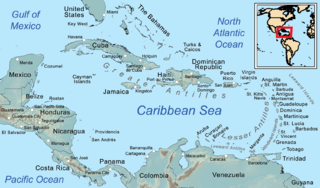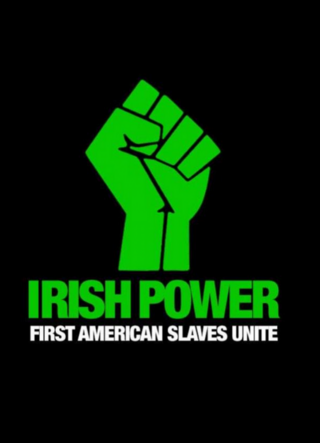Related Research Articles
Barbados is an island country in the southeastern Caribbean Sea, situated about 100 miles (160 km) east of Saint Vincent and the Grenadines. Roughly triangular in shape, the island measures some 21 miles (34 km) from northwest to southeast and about 14 miles (23 km) from east to west at its widest point. The capital and largest town is Bridgetown, which is also the main seaport.

Indentured servitude is a form of labor in which a person is contracted to work without salary for a specific number of years. The contract, called an "indenture", may be entered voluntarily for purported eventual compensation or debt repayment, or it may be imposed involuntarily as a judicial punishment. Historically, it has been used to pay for apprenticeships, typically when an apprentice agreed to work for free for a master tradesman to learn a trade. Later it was also used as a way for a person to pay the cost of transportation to colonies in the Americas.

The slave codes were laws relating to slavery and enslaved people, specifically regarding the Atlantic slave trade and chattel slavery in the Americas.

A pallbearer is one of several participants who help carry the casket at a funeral. They may wear white gloves in order to prevent damaging the casket and to show respect to the deceased person.

The Barbados Slave Code of 1661, officially titled as An Act for the better ordering and governing of Negroes, was a law passed by the Parliament of Barbados to provide a legal basis for slavery in the English colony of Barbados. It is the first comprehensive Slave Act, and the code's preamble, which stated that the law's purpose was to "protect them [slaves] as we do men's other goods and Chattels", established that black slaves would be treated as chattel property in the island's court.
Redleg is a term used to refer to poor whites that live or at one time lived on Barbados, St. Vincent, Grenada and a few other Caribbean islands. Their forebears were sent from England, Scotland, Ireland, and Continental Europe as indentured servants, forced labourers, or peons.

Sugar plantations in the Caribbean were a major part of the economy of the islands in the 18th, 19th, and 20th centuries. Most Caribbean islands were covered with sugar cane fields and mills for refining the crop. The main source of labor, until the abolition of chattel slavery, was enslaved Africans. After the abolition of slavery, indentured laborers from India, China, Portugal and other places were brought to the Caribbean to work in the sugar industry. These plantations produced 80 to 90 percent of the sugar consumed in Western Europe, later supplanted by European-grown sugar beet.

The Code noir was a decree passed by King Louis XIV of France in 1685 defining the conditions of slavery in the French colonial empire and served as the code for slavery conduct in the French colonies up until 1789 the year marking the beginning of the French Revolution. The decree restricted the activities of free people of color, mandated conversion to Catholicism for all enslaved people throughout the empire, defined the punishments meted out to them, and ordered the expulsion of all Jewish people from France's colonies.
The Indian Slavery Act, 1843, also known as Act V of 1843, was an act passed in British India under East India Company rule, which outlawed many economic transactions associated with slavery.
Irish transport to Barbados dates back to the 1620s, when Irish people began arriving on the island. The majority were emigrants, indentures, and merchants, though with an unknown number of political and convict transportees during the 1650s

Black Barbadians or Afro-Barbadians are Barbadians of entirely or predominantly African descent.
Henry Hawley was the English Governor of Barbados from 1630 to 1639/40.
Irish Caribbeans are people who live in the Caribbean, but were born in Ireland, or are descended from people who were born in Ireland. Irish Caribbeans include:
Colonel Sir James Drax was an English planter and military officer. Born in Stoneleigh, Warwickshire, Drax migrated to the English colony of Barbados and acquired ownership of several sugar plantations and enslaved people. Drax was expelled from Barbados by Royalists due to being a Parliamentarian, though he returned in 1651 when the island was returned to Parliamentarian control. Drax returned to England where he died in 1662. He would go on to establish a dynasty of wealthy slave owning sugar planters.

Indentured servitude in British America was the prominent system of labor in the British American colonies until it was eventually supplanted by slavery. During its time, the system was so prominent that more than half of all immigrants to British colonies south of New England were white servants, and that nearly half of total white immigration to the Thirteen Colonies came under indenture. By the beginning of the American Revolutionary War in 1775, only 2 to 3 percent of the colonial labor force was composed of indentured servants.

Irish indentured servants were Irish people who became indentured servants in territories under the control of the British Empire, such as the British West Indies, British North America and later Australia.

The Irish slaves myth is a fringe pseudohistorical narrative that conflates the penal transportation and indentured servitude of Irish people during the 17th and 18th centuries, with the hereditary chattel slavery experienced by the forebears of the African diaspora. Some white nationalists, and others who want to minimize the effects of hereditary chattel slavery on Africans and their descendants, have used this false equivalence to deny racism against African Americans or claim that African Americans are too vocal in seeking justice for historical grievances. It also can hide the facts around Irish involvement in the transatlantic slave trade. The myth has been in circulation since at least the 1990s and has been disseminated in online memes and social media debates. According to historians Jerome S. Handler and Matthew C. Reilly, "it is misleading, if not erroneous, to apply the term 'slave' to Irish and other indentured servants in early Barbados". In 2016, academics and Irish historians wrote to condemn the myth.
Irish immigration to Montserrat dates back to the early 17th century before and during the period of plantation owners and slavery. Montserrat is a Caribbean island and overseas territory of the United Kingdom. It is also known as "The Emerald Isle of The Caribbean" due to the large population of people with Irish descent living there. Irish people first arrived to the island in 1632 and people of mixed race with Irish descent still live on the island.

The planter class was a racial and socioeconomic caste which emerged in the Americas during European colonization in the early modern period. Members of the caste, most of whom were settlers of European descent, consisted of individuals who owned or were financially connected to plantations, large-scale farms devoted to the production of cash crops in high demand across Euro-American markets. These plantations were operated by the forced labour of slaves and indentured servants and typically existed in tropical climates, where the soil was fertile enough to handle the intensity of plantation agriculture. Cash crops produced on plantations owned by the planter class included tobacco, sugarcane, cotton, indigo, coffee, tea, cocoa, sisal, oil seeds, oil palms, hemp, rubber trees and fruits. In North America, the planter class formed part of the American gentry.
South Carolina established its first slave code in 1695. The code was based on the 1684 Jamaica slave code, which was in turn based on the 1661 Barbados Slave Code. The South Carolina slave code was the model for other North American colonies. Georgia adopted the South Carolina code in 1770, and Florida adopted the Georgia code.
References
- ↑ Collins, Justine (2021). Tracing British West Indian Slavery Laws: A Comparative Analysis of Legal Transplants. Routledge.
- ↑ Dunn, Richard S. (1972). Sugar and Slaves: The Rise of the Planter Class in the English West Indies, 1624-1713. University of North Carolina Press. p. 239.
- ↑ Hall, Richard (1764). Acts passed in Barbados, 1643-1762, no. 30. London. pp. 35–40.
- ↑ Rugemer, Edward B. (2013). "The Development of Mastery and Race in the Comprehensive Slave Codes of the Greater Caribbean during the Seventeenth Century". The William and Mary Quarterly. 70 (3): 429–458. doi:10.5309/willmaryquar.70.3.0429. ISSN 0043-5597.
- ↑ Rugemer, Edward B. (2013). "The Development of Mastery and Race in the Comprehensive Slave Codes of the Greater Caribbean during the Seventeenth Century". The William and Mary Quarterly. 70 (3): 429–458. doi:10.5309/willmaryquar.70.3.0429. ISSN 0043-5597.